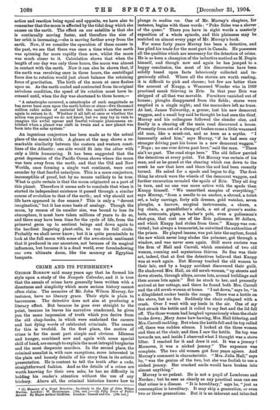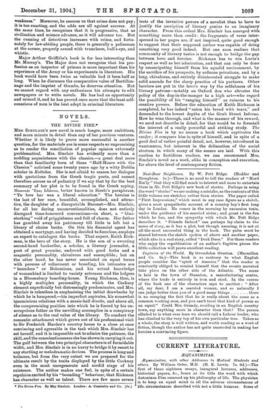GEORGE BORROW said many years ago that he formed his
style upon a study of the Newgate Calendar, and it is true that the annals of crime have generally been written with a directness and simplicity which more serious history cannot often claim. The memoirs of Mr. John Wilson Murray, for instance, have no literary grace. Their style is plain to barrenness. The detective does not aim at producing a literary effect. But because he goes ever straight to the point, because he leaves his narrative unadorned, he gives you the same impression of truth which you derive from the old chap-books, in which were enshrined the careers and last dying words of celebrated criminals. The reason for this is twofold. In the first place, the motive of crime is for the most part simple and obvious. Idleness and hunger, combined now and again with some special skill of band, are enough to explain the most intrepid burglaries and the most desperate murders. In the second place, the criminal annalist is, with rare exceptions, more interested in the plain and homely details of his story than in its artistic presentation. He is content to tell the truth after a rude, straightforward fashion. And as the details of a crime are worth knowing for their own sake, he has no difficulty in holding his reader's attention without the use of any trickery. Above all, the criminal historian knows how to • (1) Memoirs of a Great Detective: Incidents in the Life of John Wilson Murray. London: W. Heinemann. lies. net.]—(2) Fifty Years of Public Semite. Ey Major Arthur Griffiths. London : Cassell and. Co. LlSs. net.]
plunge in medias res. One of Mr. Murray's chapters, for instance, begins with these words : "Poke Soles was a shover of the queer." There you have in eight words a masterly exposition of a whole episode, and this plainness may be. matched on almost every page of Mr. Murray's book.
For some forty years Murray has been a detective, and has plied his trade for the most part in Canada. He possesses all the qualities which are necessary for the detection of crime. He is as keen a champion of the inductive method as M. Dupin himself, and though now and again he has jumped to a happy conclusion, the most of his discoveries have been solidly based upon facts laboriously collected and in- geniously sifted. Where all the stories are worth reading, it is difficult to pick and choose ; but few are better than the account of Knapp, a Weazened Wonder who in 1869 practised sneak thieving in Erie. In that year Erie was stripped of all that was movable. Furniture vanished out of houses ; ploughs disappeared from the fields ; stores were emptied in a single night; and the marauders left no trace. At last, James Tolworthy, a grocer, lost his new democrat waggon, and a small boy said he thought be had seen the thief. Murray and his colleagues followed the slender clue, and finally in a clearing off the main road discovered a house. Presently from out of a clump of bushes came a little weazened old man, like a musk-rat, and as keen as a scythe. "I innocently asked him," says Murray, "if he had seen any stranger driving past his house in a new democrat waggon." " Nope ; no one ever drives past here," said the man. "There ain't no past. The road stops here." The old fellow parried the detectives at every point. Yet Murray was certain of his man, and as he gazed at the clearing which ran down to the creek he saw that here and there the sod had been recently turned. He asked for a spade and began to dig. The first thing he struck were the wheels of the democrat waggon, and further excavation revealed the spoils of Erie. They all dug in turn, and no one was more active with the spade than Knapp himself. "We unearthed samples of everything," says Murray, "from a needle to an anchor, a shroud, a toilet set, a baby carriage, forty silk dresses, gold watches, seven ploughs, a harrow, surgical instruments, a churn, a log chain, a grandfather's clock, a set of grocer's scales, hats, overcoats, pipes, a barber's pole, even a policeman's shot-gun, that cost one of the Erie policemen 80 dollars, and which Knapp had stolen from them." Knapp was con- victed; but always a humourist, he outwitted the authorities of the prison. He played insane, was put into the asylum, found the saw which never long eludes the prisoner, got through a window, and was never seen again. Still more curious was the firm of Hall and Carroll, which consisted of two old women, cunning and mysterious thieves. So fine was their art, indeed, that at first the detectives believed that Knapp was at work again. But Murray tracked the old women to their lair, and by a happy accident discovered their guilt. He shadowed Mrs. Hall, an old scrub-woman, "up streets and down streets, through alleys, across lots, around buildings and then across lots again." But he stuck to her, and presently arrived at her cottage, and there he found both Mrs. Carroll and the old scrub-woman at home. "I sat down," says he, "in a dilapidated rocker beside the range. There was a kettle on the stove, but no fire. Suddenly the chair collapsed with a crash. Over I went with my heels in the air. One of my feet struck the kettle and it rolled to ray feet and the lid fell off. The three women had laughed uproariously when the chair broke down; ,Mary Anne haw-hawing, Mrs. Hall tittering, and Mrs. Carroll cackling. But when the kettle fell and its top rolled off, there was sudden silence. I looked at the three women and then at the chair, and then I saw the kettle. Its top was towards me, and inside I observed what I thought was a stove lifter. I reached for it and drew it out. It was a jemmy ! Moreover, it was a nicked jemmy." The exposure was complete. The two old women got four years apiece. And Murray's comment is characteristic. "Mrs. Julia Hall," says he, "was the genius of the two, but she was foolish to use a nicked jemmy. Her cracked smile would have broken into almost anything."
Murray is no pedant. He is not a pupil of Lombroso and Nordau ; but he sees as clearly as any practical man can see that crime is a disease. "It is hereditary," says he, "just as consumption is hereditary. It may skip a generation, or even two or three generations. But it is an inherent and inherited
weakness." Moreover, he assures us that crime does not pay; it is too exacting, and the odds are all against success. At the same time, he recognises that it is progressive, that as civilisation and science advance, so it will advance too. But the cunning of detectives increases with crime, and fortu- nately for law-abiding people, there is generally a policeman at the corner, properly armed with truncheon, bull's-eye, and whistle.
Major Arthur Griffiths's book is far less interesting than Mr. Murray's. The Major does not recognise that his pro- fession as an inspector of prisons is more important than his experience of the Army or his experiments in literature. His book would have been twice as valuable had it been half as long. When he discusses the comparative value of Bertillon- nage and the imprint of thumbs, he deserves attention. But we cannot regard with any enthusiasm his attempts to edit newspapers or to write novels. He has had an opportunity and missed it, and he has proved once more that the least self- conscious of men is the best adept in criminal literature.



































 Previous page
Previous page